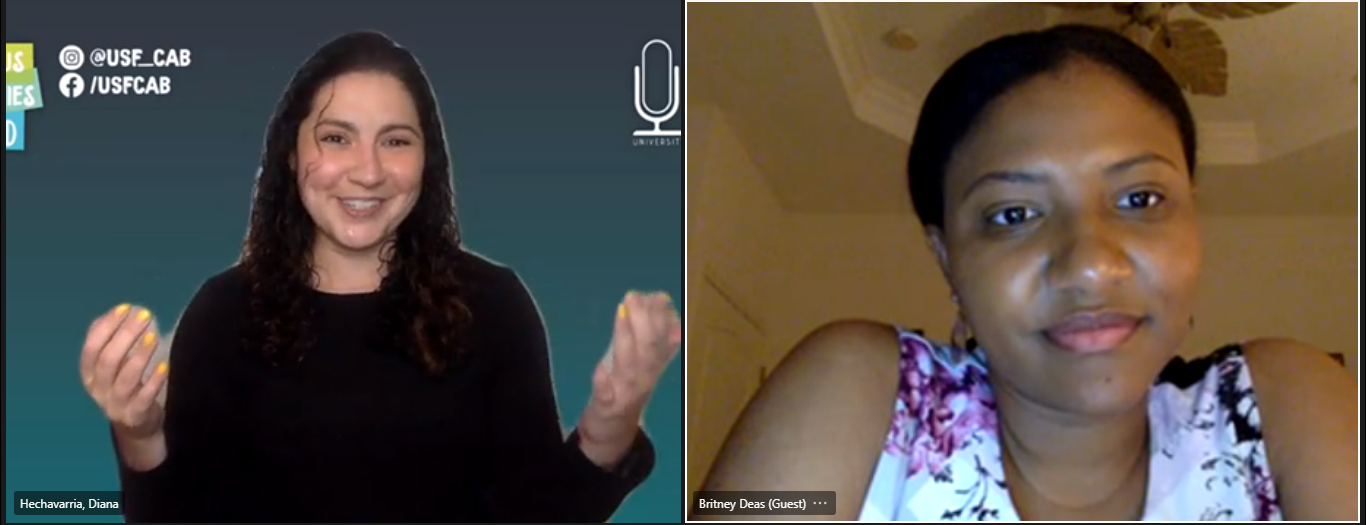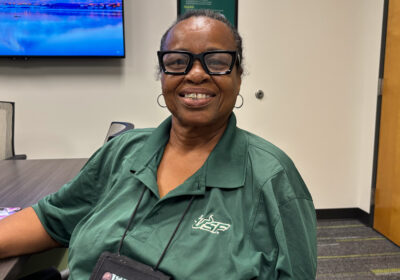Taking the lead: Diana Hechavarria advocates for more women in business during Thursday ULS

This story is part of a continuing series that features women leaders at USF during Women’s History Month.
As a volunteer teaching English to immigrants alongside her grandmothers when she was a child, Diana Hechavarria, associate professor of entrepreneurship at USF, learned the importance of using her voice and advocating for the empowerment of those facing adversity at work and in life.
“Very often in society, we forget that we have this voice, and it’s not just women, it’s people overall,” Hechavarria said.
“So I think for me when I’m thinking about the concept of women empowerment, [I think of] opportunities for us to use our voice in society and to make a change in society and that’s one of the reasons I study entrepreneurship because I see that as a mechanism, or a vehicle, to enact that voice toward change.”
In the first community-based ULS of the year, Hechavarria shared her message for female empowerment to an audience of 18 people on Microsoft Teams Thursday at 7 p.m. The small gathering made the hour-long event an intimate one, with Hechavarria sharing personal anecdotes from her career and advice with the students in attendance.
The USF professor has participated in research that analyzes gender dynamics in business startups and is a leader in entrepreneurship at the university. She won USF’s Women in Leadership and Philanthropy’s Dr. Kathleen Moore Faculty Excellence Award and was recognized by USF’s Status of Latinos Presidential Advisory Committee for research she conducted about minority entrepreneurship.
However, as a woman working in a male-dominated field, she said she’s overcome many barriers to get where she is today.
“One of the barriers that I think I’ve faced is learning not to conform to normative standards of maleness,” Hechavarria said.
“A lot of the time, when an industry is male-dominated, you have standards that are set by people who are, I say this very kindly, men who don’t understand that by setting certain standards, they’re pushing away alternate voices or minimizing alternate voices, which can be just as informative to understanding a phenomenon or working around the problem you might face in the workforce or in any job.”
Through maintaining an authentic character, Hechavarria said she has learned how to move forward in her career by identifying what is important to her and turning those values into goals to fulfill. She said she’s also used this sincerity to uplift others in her field.
“I’ve always said [that] with me, what you see is what you get,” Hechavarria said. “I’m very aware that my competitive advantage as a person is that I am always authentic, and I come from a place of empathy and I care about people. I’m here to get a job done, I’m here to help foster and create future leaders along the way, so I always talk to my students and to my colleagues and [tell them], ‘I want to help mentor you so you take my job.’”
With a smile on her face, she remembered how her grandmothers inspired the service spirit in her. Since she was a child, Hechavarria volunteered to teach English to immigrants with her grandmothers. Being raised by her grandparents motivated her to implement philanthropic efforts in her entrepreneurial career.
“They would always tell me that if you want to advance in life and you want to make a difference in society it’s always important to pay it forward, and I’d always see them doing that,” Hechavarria said.
“So even knowing that they didn’t have a lot of money, they were the first ones to make a donation at some event or some cause, they were the first ones to volunteer their time when they were already kind of overwhelmed maybe of other things that they were having to deal with.”
She learned to appreciate the moments where she felt she gave back to the community and said those volunteering experiences gave her more satisfaction than other achievements she’s amassed throughout her life.
“They were really instrumental, both of [my grandmothers], in making me realize that it’s really important to give back to society because that really brings self-fulfillment,” Hechavarria said.
“You can have all the accolades and all the achievement, but at the end of the day that’s not going to bring self-fulfillment. At least for me personally, it’s knowing that I can help bring others up and pay it forward to help others as well.”
During the lecture, she spoke about her recent work with the Junior League of Tampa — a nonprofit that seeks to develop the leadership potential of young women in the community — where she collaborated in a project named the Mobile Interactive Literacy Opportunity aiming to teach people how to read in the community,
“So in those areas where we don’t have a lot of access to libraries and opportunities to engage in, learning circles and things of that nature, we’re really, really focused on that [area], that’s been a really big success,” Hechavarria said.
“And we have some other projects that really focus on developing the potential of women so we can kind of go out in the community.”
While Hechavarria spoke largely on the importance of women emerging as leaders in the business realm, she also noted that men have an equally important role in their advancement. She said men have to recognize that women face adversity, and speak up in support of them.
“I think the most important role of an ally is that voice that we talked about earlier. As women, don’t forget we have a voice, as a white male or a Black male, or any male, you have a voice, so use that voice to lobby for issues that you may be seeing,” she said.
“If you have a sister, girlfriend or a colleague that might be experiencing some adversity, ask how you can use that voice to help her deal with that adversity or help her overcome that adversity at work or in entrepreneurship and life in general, using your voice is so important.”
In order to embrace the empowerment of women in the business sector, according to Hechavarria, people need to have a future-looking mindset. She said people need to be open to change and to embrace it because that is how the best business ideas occur.
“I think the best advice is just constantly be futuristic, keep looking forward to the future,” she said.
To demonstrate the idea of forward-looking business ventures, Hechavarria took the time to bust myths about entrepreneurship and the presence of women in the business industry. She made it a point to communicate that the 1980s idea of business owners needing to be “sharks” is no longer true.
“The 80s are a long time ago and I think this century is really going to be more about how we [as business owners] integrate people, planet and profits to kind of create a sustainable future for our children and our children’s children,” she said.
That sustainable future, she said, has women as the driving force behind it. Hechavarria hopes that her goals will ultimately be realized when she sees a greater presence of women in the business sector. She wants to see women flourishing and achieving success as entrepreneurs.
“I’m waiting to see a day with all women on the Fortune Top 25,” she said.
“I want to see an all women board, that would be, for me [an indication that] I’ve done my job in helping progress change by voicing this problem [of having a lack of women in business leadership]. So I hope that’s something in my lifetime I ultimately get to see.”
When teaching her students, Hechavarria said she always emphasizes the importance of having a variety of individual skills, ranging from networking prowess to an affinity for design, to make a business more successful.
One skill area she considered crucial she called “soft skills,” which are more abstract in nature than technical skills.
“In the soft skills area, you need to be able to manage divergent groups of people’s thinking. One of the things we see a lot in startups is that there’s a lot of conflicts but it’s [the] positive conflict that gets the venture up and running,” she said.
“It’s not a negative conflict that could affect performance in a bad way. So you need to be able to listen and manage the different types of conflict.”
Hechavarria said that to accompany soft skills, business owners will also need more practical “hard skills.”
“A hard skill right now is a lot of people have these great ideas, and they don’t have any programming skills,“ she said.
“So I always encourage anyone who’s thinking about doing anything that’s going to be digitalized or using the internet or computers to have some basic programming skills, and you don’t have to be an awesome coder, but it is nice to be able to read some basic Python and some basic code.”
For the entirety of the event, Hechavarria emphasized that for women to be empowered in the business sector, they have to be willing to take the risk of putting themselves out there and turning their ideas into reality.
“The times I have failed have informed me. Now to get where I am, I think one of the things I wish I would have known is how hard it would be, and that I was going to fail,” she said.
“The times that I have failed, and the times that I’ve been kind of upset at myself for not meeting some type of goal or benchmark have made me the woman I am today.”






